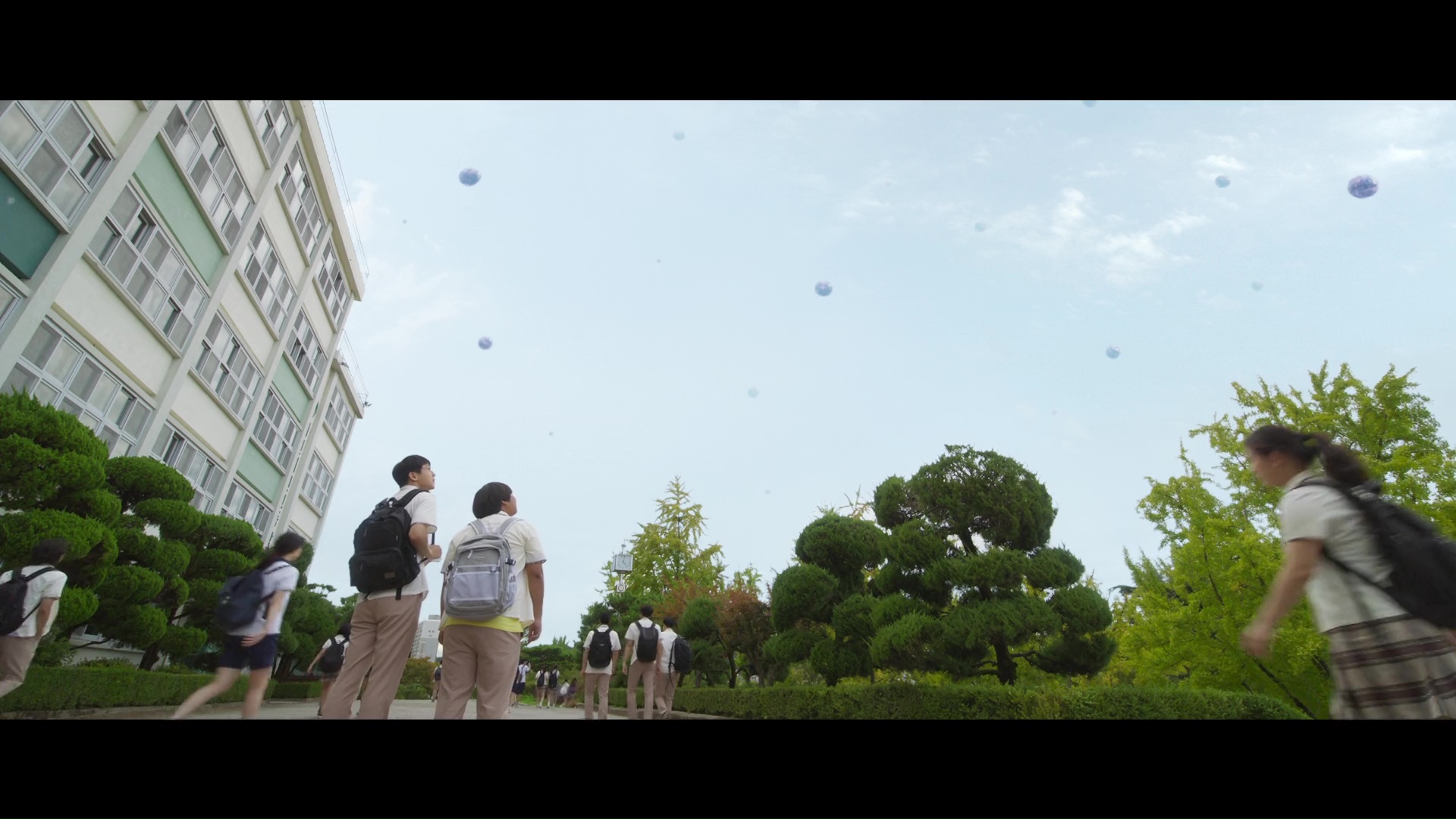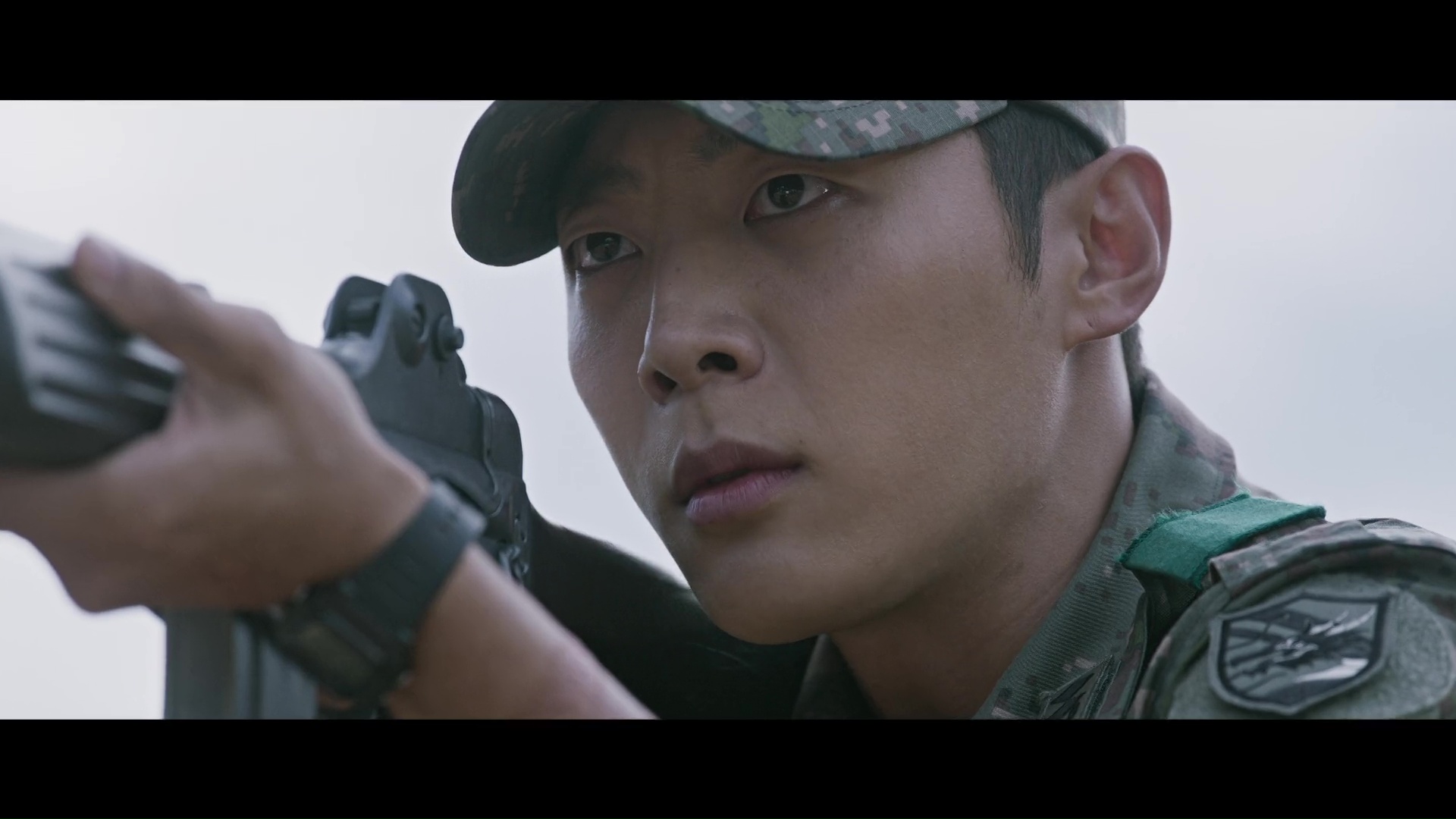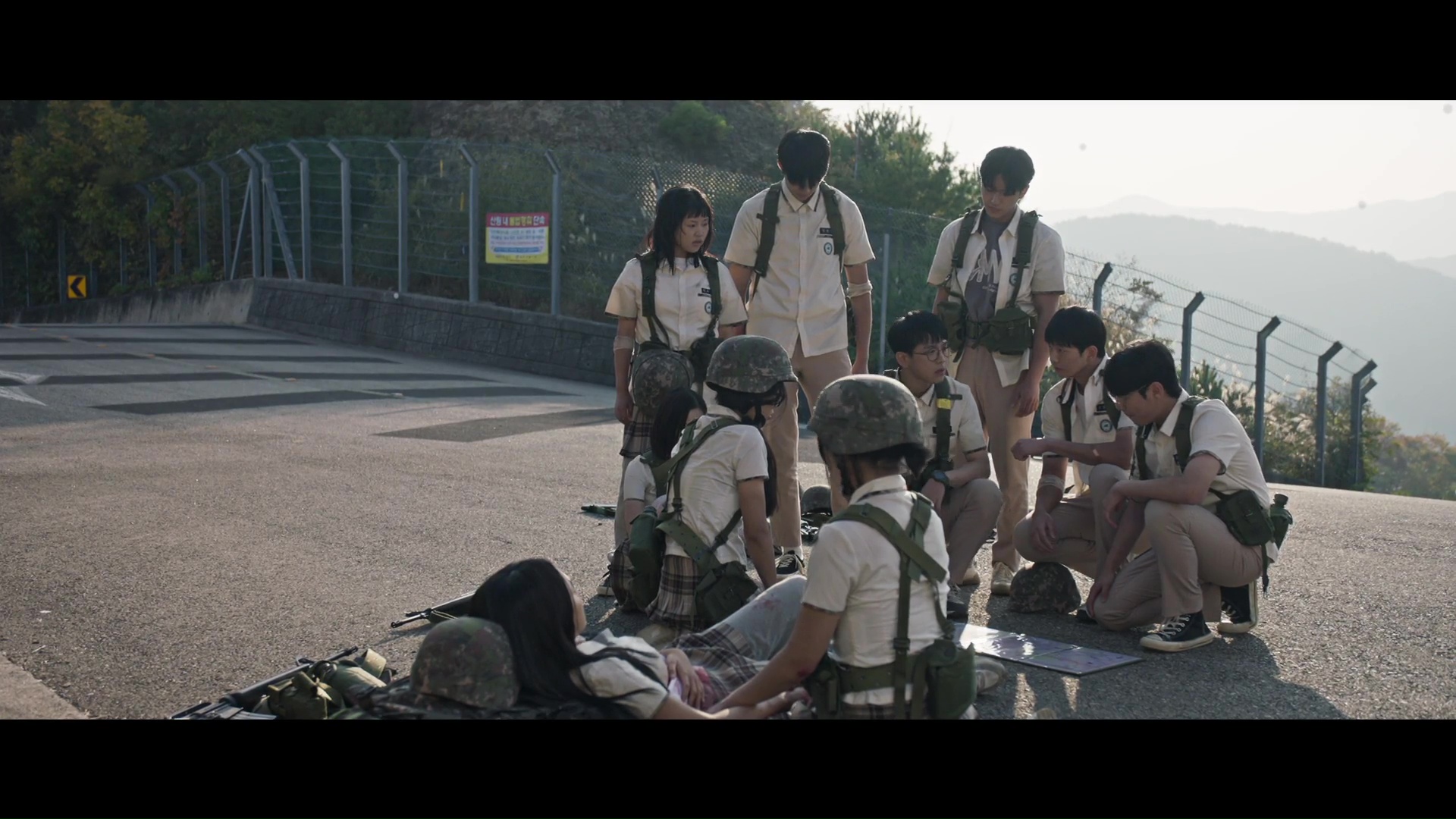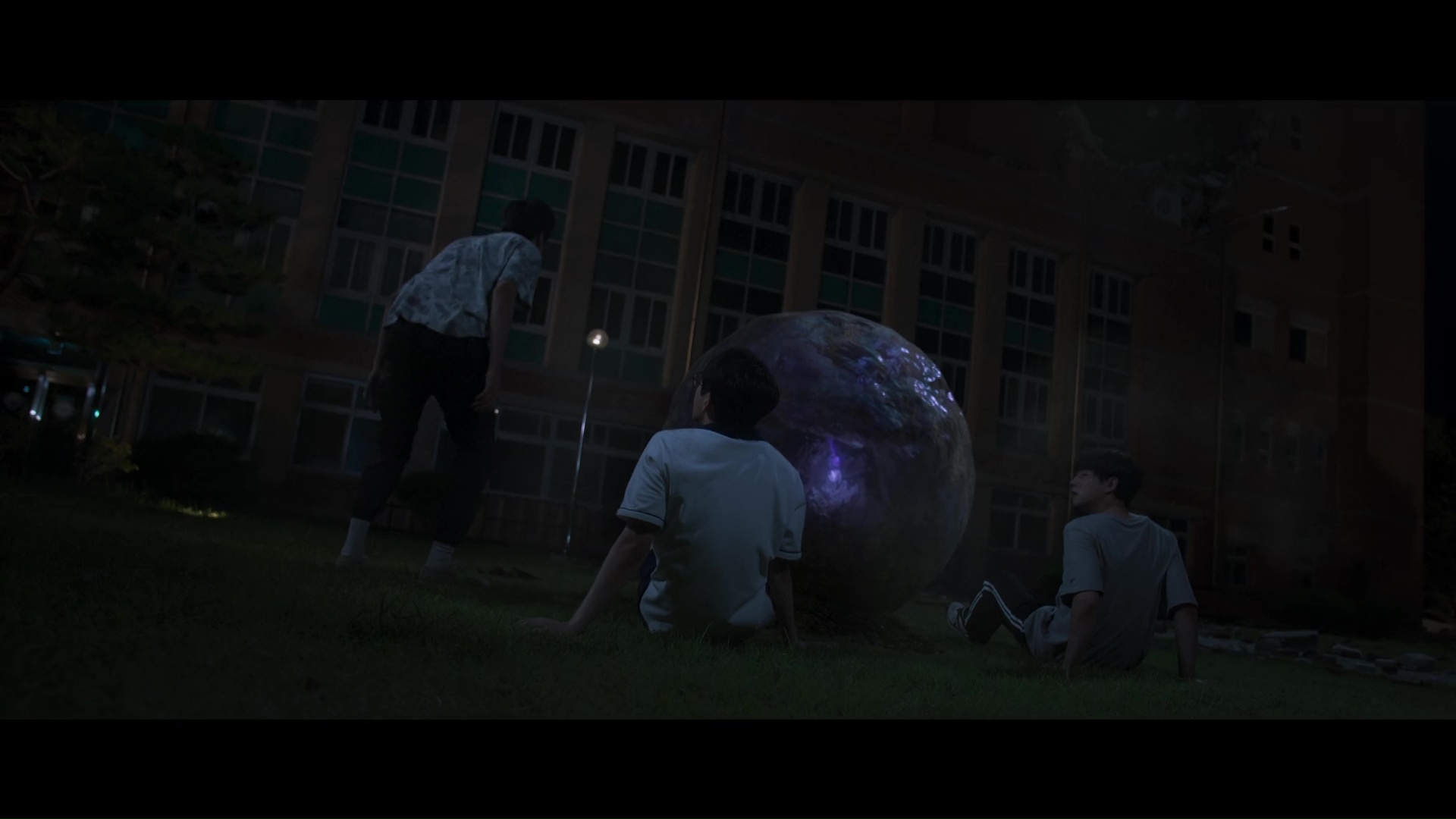
TYPE OF REVIEW ![]() : GOOD OL’ REVIEW
: GOOD OL’ REVIEW
No spoilers. Click here for Review of Part 2.

It is quite a feat for a series to be so flawed, yet so entertaining at the same. That’s exactly how TVING’s Duty After School (방과 후 전쟁활동/After School War Activites) is. Divided into two parts, these first six episodes feature a lot of dynamic action, but very little else. And that dropping of the ball holds the series back from being something more.
Duty After School begins one year after strange spheres suddenly appear in the sky around the world. In the preceding year, the spheres are deemed not a threat and the world has seemingly accepted and learned to live with their ominous presence. But when the spheres finally reveal themselves to be deadly alien creatures, Korea mobilizes its citizens as its military force is quickly depleted. That includes drafting high school seniors with the incentive of earning extra credit on the pivotal CSAT, the country’s college entrance exam.
The series follows the students of Class 3-2 of a Seoul high school as they are thrust into the throes of war against an unprecedented foe. Lieutenant Lee Chun Ho (Shin Hyun Soo) leads the students’ training and struggles to manage their undisciplined and careless attitudes. But the group of bratty teens get a rude awakening about the realities of the situation and must somehow come together in order to survive the alien invasion.

The series is fascinating on many levels. Its premise alone is a refreshing take on a familiar story. With the rise of zombie stories and the popularity of Netflix’s All Of Us Are Dead last year, having alien creatures be the deadly foes already offers something different and opens the door to different possibilities. Especially with the setting bringing about the usual hallmarks of a high school drama: teen angst, bullying and school violence, educational pressure.
But somehow, the series falls short in many aspects. Not the least of which being the characters’ lack of depth. A character-driven story this series is not. And that is despite a pretty solid, if not strong cast made up of experienced vets and first-time newbies.
With any sci-fi survival drama, the chaotic spectacle will always be the attention-grabber. And here on Duty After School, it is the highlight and is what carries the weight of the series. Action sequences of the usual chase-hide-battle formula wherein the teens and their adult leaders have to run from and eventually take on the agile alien creatures are legitimately exciting. The explosive action scenes are top quality. And the chaotic nature of the situation is effectively conveyed in those kinetic scenes.
But you always hope for something a bit more. Unfortunately, the series doesn’t take itself too seriously. And at times, that it is almost to its detriment.
The series bounces between high energy sci-fi action, almost-slapstick comedy and (unsuccessful) attempts at emotional highlights. But the struggle to balance that tone in a less-than-seamless way fuels a sort of jarring and forced feeling to any of the non-action sequences.
That in turn negatively affects (or is perhaps caused by) the carboard cutout characters. Especially the students. The characters are all paint-by-the-numbers, cookie cutter high school drama archetypes. A couple of the teens even seemingly cut from the same singular character.
It is a large ensemble group of at least 20 teens. And save for a select few (if that), most of them are stagnant caricatures that are merely plot devices or forgettable alien fodder.
Obviously, this is a high school drama at its core. And the series features many slower, quieter (and stereotypical) moments with the high school antics as their focus. But even when mixed with the sci-fi, those moments hold the series back.

The lack of depth and development (and generally unlikable personalities) prevents being able to connect with the majority of the cast of characters. Thus, it can be difficult to care about their fates. And maybe even have you start rooting for the alien blobs instead.
Though there are certainly a few worthy characters to hold on to, most are written without any character development, or are even written with clear regression without any relation to the overall story. It doesn’t help that the most annoying characters are the loudest and get the most screentime either.
Having the large group offers the opportunity for a feeling of community coming together and bonds forming in the midst of a disaster. But what the series instead does with the characters ends up being hollow. There is a lack of sincerity that is almost pervasive enough to derail the series.
Like I mentioned earlier, for a series like Duty After School, you come for the spectacle. And anything extra is icing on the cake. But at the same time, you want to have something more than just an adrenaline rush.
Well-written, multi-faceted characters can be that something extra. And though you can’t come into a story like this expecting philosophical discussions about societal ills or the essence of humanity, getting those moments are also an extra treat.
Other series have been able to do that. And what’s interesting is that Duty After School does attempt those kinds of moments. At times, the series seems to want to offer some kind of commentary on the Korean education system and the pressure it puts on youth. Other times, the series wants to push the “adults bad, kids good” theme. But these unsuccessful attempts are merely used as either convenient plot devices or time fillers.
You obviously have to have a suspension of disbelief when coming into a series like this. But there is also so much you can tolerate before things get too eyeroll-inducing.
After watching these initial six episodes (the final four will be released on April 28th), I decided to swipe through the original webtoon, especially the final chapters not adapted into these six episodes. And from that quick perusal, I get the impression that the webtoon features much more character and story nuance in its short format compared to the episodes which all run more than an hour. How a longer television (or streaming) format is unable to provide more nuance and depth than the limited panels of a webtoon is beyond me.
But that brings us back to my opening sentiment of this review. It is quite a feat for Duty After School to have so many flaws, yet be so entertaining at the same time.

This first part of Duty After School is definitely not a waste of seven hours. And after investing that time in these episodes, you’ll probably want to come back for the final four in a few weeks. The legitimately edge-of-your-seat, thrilling action is the kind of mindless fun you can’t help but enjoy. But the series is only just. Pairing that exciting dynamic with depth and sincerity would have elevated this series and possibly redefined the genre(s) in Korean drama. Instead, a lot of unrealized or even wasted potential is thankfully saved by a slick, high quality production. And in the end, makes Duty After School the best example of enjoyable, yet mindless fun.
